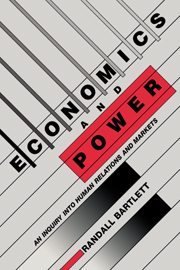Book contents
5 - Information, uncertainty, and power
Published online by Cambridge University Press: 18 September 2009
Summary
The knowledge of the circumstances of which we must make use never exists in concentrated or integrated form, but solely as the dispersed bits of incomplete and frequently contradictory knowledge which all the separate individuals possess.…
… in any society in which many people collaborate, this planning, whoever does it, will in some measure have to be based on knowledge which, in the first instance is not given to the planner but to somebody else, which somehow will have to be conveyed to the planner.
Frederick A. Hayek, “The Uses of Knowledge in Society”Ignorance and independence
In the modern world, each of us is dependent upon others to fulfill many of our needs and desires. The self-sufficiency of Robinson Crusoe may still be popular in first-year graduate school classrooms, but it has little relevance elsewhere. Contemporary “survivalists,” fearing a coming conflagration, stock up on manufactured weapons and commercially prepared and preserved foods. They transport these items in commercially acquired vehicles over government funded roads to rural areas selected on the basis of their social character. No one can start from scratch and create any semblance of a modern standard of living. Society is, by definition, “social.”
What we need from each other, however, is less a sharing of effort than it is a sharing of information, of technology, of simple knowhow.
- Type
- Chapter
- Information
- Economics and PowerAn Inquiry into Human Relations and Markets, pp. 73 - 101Publisher: Cambridge University PressPrint publication year: 1989



